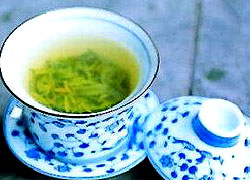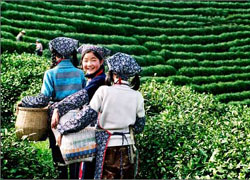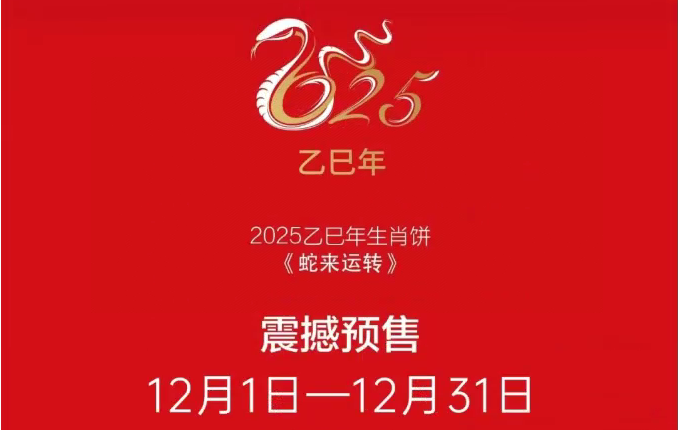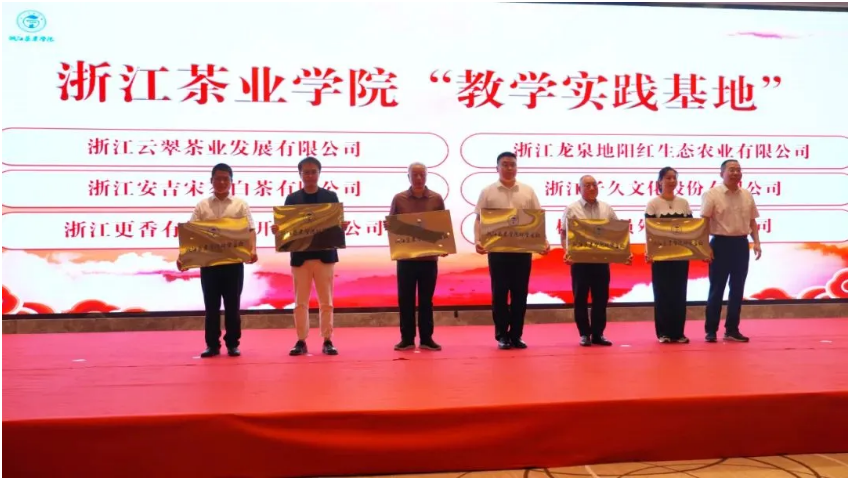Zhejiang is one of China's leading tea-producing areas. Longjing Tea, named after the local village whose name means Dragon Well, is considered China's finest green tea. China Tea Museum
Longjing came into prominence three centuries ago, during the Qing Dynasty. On his three visits to Zhejiang province, th e illustrious emperor Qianlong always made a point of visiting the village to have a cup of the delicious local tea. He enjoyed it so much that he designated eighteen of Longjing's trees as producers of imperial tea. This royal mark of approval ensured Longjing tea's special reputation, and the imperial tea-trees have turned the Dragon Well village into a major tourist attraction.
e illustrious emperor Qianlong always made a point of visiting the village to have a cup of the delicious local tea. He enjoyed it so much that he designated eighteen of Longjing's trees as producers of imperial tea. This royal mark of approval ensured Longjing tea's special reputation, and the imperial tea-trees have turned the Dragon Well village into a major tourist attraction.
The local people have a special bond with their famous tea. The pleasant climate and fertile land of the area are ideal for growing the healthiest tea trees, and for generations, Longjing has prospered.
Records of tea production in Zhejiang date back as early as the Wei and Jin Dynasties, 1500 years ago. In the 8th century, during the Tang Dynasty, the renowned scholar Lu Yu wrote the first book about Longjing tea culture, thus gaining the title of the Sage of Tea. The story goes that Lu Yu was traveling to Guzhu Hill in Zhejiang, when he came across a tea named Gu-zhu-zi-sun. He took some leaves back to the imperial court, where the quality of the tea was much appreciated, and thus the area became famous for its tea. Today, on the site where the imperial tea was once produced, a monument still stands as testimony to the historical importance of the tea and its close association with Chinese culture.
Spring is the time when the tea trees sprout their new growth, and also the busiest time of year for the tea farmers. On average, more than sixty thousand leaves are needed to make up a single kilogramme of Longjing tea. Though much of the picking these days is done by machine, some farmers still maintain the tradition of picking by hand. They claim this ensures a superior product as the pickers can identify leaves of the proper colour and size. Machines, though they speed up the harvest, are not capable of grading the leaves for quality.
So each April, at the height of the picking season, farmers throughout Longjing Village can be seen stooping over their tea trees, selecting the finest leaves. It's an ideal time for visitors to take a deep breath of the spring-scented air, sip the imperial infusion, and buy some famous Dragon Well tea leaves to take to family and friends back home.
The fine green tea of Longjing is one of the twin wonders of Hangzhou. The other is the reputed magic water of Hupao Spring ,or Tiger Running Spring. When two natural wonders come together something very special happens. This can be seen each day as Hupao Spring is lined with people waiting to fetch water to make their tea. Longjing tea made with Hupao Spring water is known as Hu-Long-Yin, which means Tiger and Dragon Drink.
Locals enjoy their tea at the village tea-house, which has been a traditional part of Hangzhou life ever since the Song Dynasty a thousand years ago, when the city was the imperial capital. Today, the tea-house is Hangzhou people's favorite place to wile away their time.
For a charge of just 15 yuan a month, people can bring their own tea and cup here, and spend the whole morning in the tea hous e. Among the most regular customers are the elderly bird-keepers, who form a circle in a corner, swapping stories. It's not so much the thirst for tea that brings them here, but the companionship.
e. Among the most regular customers are the elderly bird-keepers, who form a circle in a corner, swapping stories. It's not so much the thirst for tea that brings them here, but the companionship.
Drinking tea is part of the lifestyle and tradition in Zhejiang, and is deeply rooted in people's life. In Hangzhou, the tea-houses are nearly part of the natural landscape. Qu-Yuan-Feng-He is a well-known scenic spot at the famous West Lake, and the tea-house there is built in the shape of a boat. The style of the building and its location give visitors the sense that they are floating on water.
The experience of sipping your tea at Yan-Xian Cave is equally wonderful. Here, up in the green hills of Longjing Village, you can sit amid the birdsong and chattering brooks. Rainy days have a special charm, when the rhythm of the falling rain accompanies Nature's melody and adds to the sense of relaxation.
It is said that the literary artists of Ancient China were inspired either by tea or by wine. Those who were fond of wine were said to write in a passionate and heroic style; those who preferred tea tended to be sentimental and romantic. In Zhejiang, one can discover that romantic spirit for oneself, enjoying a cup of imperial tea in a peaceful setting with good company.





发表评论 取消回复